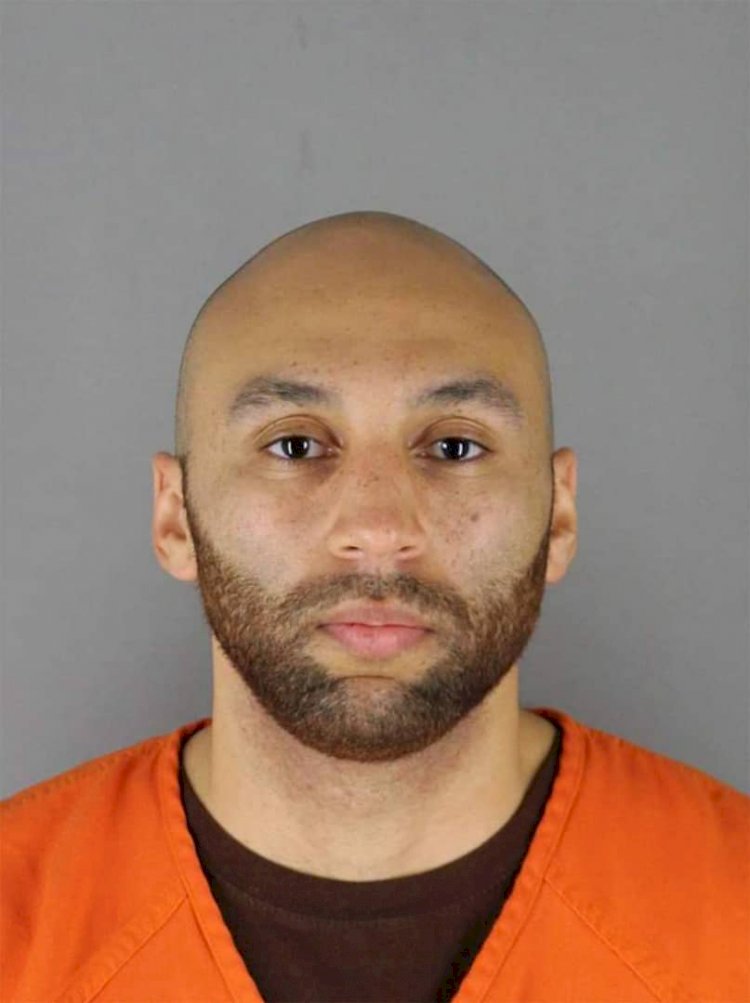Is the black police officer in George Floyd’s case really Nigerian?
Is Alex Kueng Really Of Nigerian decent.

The New York Times has just reported that Alexander Kueng, one of the officers being charged for their involvement in the death of George Floyd in Minneapolis, United States, has Nigerian roots.
Chauvin faces charges of second-degree murder and second-degree manslaughter; Alex and two other former officers were charged with aiding and abetting the killing.
Alex, whose full name is J. Alexander Kueng (pronounced “king”), aged 26, was reported to have been the youngest and least experienced officer among the four officers that responded to a call about a fake $20 bill being spent in a store — Alex’s third day on the job.
He and Thomas Lane, a fellow police trainee at the Academy, now partnered up despite both being freshly minted rookies, were the first officers to answer a call of a counterfeit $20 bill being passed at a corner store.
They found late Floyd in a car outside. After they failed to get Floyd into the back of a squad car, Chauvin and Tou Thao, another officer, showed up.
As Chauvin jammed his knee into the back of Floyd’s neck, Alex held down Floyd’s back, according to a probable cause statement filed by prosecutors.
Chauvin kept his knee there as Floyd repeated “I can’t breathe” and “mama” and “please.” Through the passing minutes, Alex did nothing to intervene, prosecutors say. After Floyd stopped moving, Alex checked Floyd’s pulse.
“I couldn’t find one,” Alex told the other officers.
Alex, whose mother is white and father from Nigeria, has brought anguish to his friends and family.
“It’s a gut punch,” the mother, Joni Kueng told New York Times. “Here you are, you’ve raised this child, you know who he is inside and out. We’re such a racially diverse family. To be wrapped up in a racially motivated incident like this is just unfathomable.”
The disgraced former officer was raised by his mother alongside his adopted African-American siblings with an absentee Nigerian father.
Two of Alex’s siblings, Taylor and Radiance, both of whom are African-American, joined protests in Minneapolis and had called for the arrests of all four officers, including their brother.
Long before Alex was arrested, he was said to have wrestled with the issue of police abuse of black people, joining the force in part to help protect people close to him from police aggression.
According to his mother, he argued that diversity could force change in a Police Department long accused of racism.
He had seen one sibling arrested and treated poorly, in his view, by sheriff’s deputies. He had found himself defending his decision to join the police force, saying he thought it was the best way to fix a broken system.
Alex had clashed with friends over whether public demonstrations could actually make things better.
READ ALSO:
Another Officer in George Floyd’s death set free

“He said, ‘Don’t you think that that needs to be done from the inside?’” his mother, Joni Kueng, recalled him saying after he watched protesters block a highway years ago. “That’s part of the reason why he wanted to become a police officer — and a black police officer on top of it — is to bridge that gap in the community, change the narrative between the officers and the black community.”
As a child, Alex sometimes asked for siblings.
His mother, who lived in the Shingle Creek neighborhood in north Minneapolis, signed up with an African-American adoption agency.
When Alex was 5, his mother brought home a baby boy who had been abandoned at a hospital.
Alex soon asked for a sister; Radiance arrived when he was 11. Taylor and a younger brother came in 2009 when Alex was about 16.
Alex went to Monroe College in New Rochelle, N.Y., to play soccer and study business. But after surgery on both knees, soccer proved impossible and he quit.
Back in Minneapolis, he enrolled in a technical college and supported himself catching shoplifters at Macy’s.
About that time, Alex started talking about joining the police, his mother recalled. She said she was nervous, for his safety and also because of the troubled relationship between the Minneapolis police and residents.
By February 2019, Alex had made up his mind: He signed up as a police cadet. In December, he graduated from the police academy.
For most of his field training, Chauvin, with 19 years on the job, was his training officer.
On May 22, Alex officially became one of about 80 black officers on a police force of almost 900. In recent years, the department, not as racially diverse as the city’s population, has tried to increase the number of officers of color, with limited success.
Critics of the police said the fact that none of the junior officers stopped Chauvin showed that the system itself needed to be overhauled.
All four officers have been fired and they face 40 years in prison.
Alex, who was released on bail on June 19, declined through his lawyer to be interviewed.
But he is set to appear in court today.






































